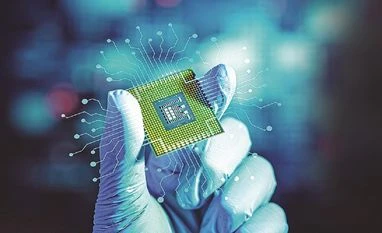The Ministry of Electronics & Information Technology (Meity) has received a lion’s share of 62 per cent of the total allocation of Rs 21,085 crore earmarked in the Union Budget 2024-25 (FY25) for two flagship projects focused on enhancing manufacturing and Make in India initiatives.
The two schemes include the much-touted production-linked incentive (PLI) scheme, which now covers 16 sectors instead of 14, including toy, footwear, and leather.
The second scheme is the modified programme for the development of semiconductors and displays, which provides incentives to companies to set up silicon and compound fabrication (fab), display fab, assembly, testing, marking, and packaging (ATMP), outsourced semiconductor assembly and test, and design companies in the country.
In the Budget, the finance ministry has more than doubled the allocation for the two schemes from last year’s Rs 9,509 crore to Rs 21,085 crore. Meity’s allocation from the Budget for the two schemes has also more than doubled from Rs 6,062 crore in 2023-24 (FY24) to Rs 13,103 crore in FY25.
Meity is the administrative ministry for the semiconductor scheme as well as the most successful PLI scheme, which is for large-scale electronics manufacturing (mobile devices), apart from the revamped PLI for information technology (IT) hardware, which initially struggled to take off.
Other ministries, such as the Ministry of Heavy Industries, have received the second-highest allocation this year through two PLI schemes — automobile (auto) and auto component and advanced chemistry cell battery — with a total allocation of Rs 3,750 crore. This is followed by the Department of Pharmaceuticals, with an allocation of Rs 2,143 crore for their three PLIs — schemes for promoting domestic manufacturing of medical devices, bulk drug parks, and medical device parks.
The good news is that the automotive sector, which provides incentives for electric vehicles and components, is finally taking off. The allocation in the Budget for it has increased sevenfold from the Revised Estimates (RE) of FY24 to Rs 3,500 crore this year. This will help companies like Ola Electric, Bajaj Auto, and TVS Motor Company in two-wheelers, and Tata Motors and Maruti Suzuki India in passenger cars, especially as support through the Faster Adoption and Manufacturing of (Hybrid &) Electric Vehicles in India (FAME) scheme wanes.
Even the PLI for specialty steels, after several hiccups, is slowly taking off. The allocation in the Budget has increased over 100 times from FY24 to Rs 245 crore in FY25.
As of December 2023, 57 memoranda of understanding have been executed, five units have started production, and nine more are expected to come online by March 2024.
The Ministry of Steel expects Rs 10,000 crore in investments in FY25, in addition to the Rs 12,900 crore invested last year.
A big push is also expected in the PLI for white goods (especially to manufacture air conditioners and light-emitting diode lights), which has been reopened for new and current eligible players to upgrade to a higher target segment from July 15. As a result, its allocation has been increased by four and a half times in FY25 to Rs 298.02 crore.
The semiconductor industry has occupied pride of place in Prime Minister Narendra Modi government’s aggressive moves towards making India a key player in this arena.
Mega projects like the fab plant and ATMP project by Tata Group and Micron Technology’s ATMP plant are on track.
Consequently, the allocation in FY25 has been increased from the RE of FY24 by over four and a half times to Rs 6,903 crore, and two times compared to the initial Budget Estimates last year.
However, there are other areas of concern. The PLI for textiles, which was launched in September 2021 with an allocation of Rs 10,683 crore to enhance the production of man-made fibres, is not on track. Its allocation this year has been pegged at Rs 45 crore only.
The PLI for IT hardware, which had to be revamped due to initially low interest, will take a while to get on track. The allocation has been increased from Rs 70.42 crore in FY24 (initial outlay was Rs 150 crore) to Rs 75 crore in FY25.
According to Meity, 17 of the 27 companies eligible under the scheme will start production this year. Therefore, major allocations are expected next year from the scheme, which has a budget allocation of Rs 17,000 crore.
Unlock 30+ premium stories daily hand-picked by our editors, across devices on browser and app.
Pick your 5 favourite companies, get a daily email with all news updates on them.
Full access to our intuitive epaper - clip, save, share articles from any device; newspaper archives from 2006.
Preferential invites to Business Standard events.
Curated newsletters on markets, personal finance, policy & politics, start-ups, technology, and more.
)